What Are the Most Common Reasons for Recurrent Miscarriage?
Fertility Treatment
Recurrent miscarriage is a rare condition when the mother loses her fetus in two or more consecutive pregnancies. Repeated miscarriage happens due to immunologic and metabolic disorders, uterine issues, etc. This problem can be treated by medication, assisted reproductive technologies, and uterine surgery.
Miscarriage is the sudden loss of the fetus before birth, which usually happens in the first five months of pregnancy or before week 20. If someone has two abortions in a row or three sporadic miscarriages, it is called recurrent miscarriage. According to the latest studies, the chance of experiencing two consecutive abortions is about 24%. This number reaches 30%, 35%, and 40% in later pregnancies.
If habitual abortion happens once, the problem is not serious and can be treated with simple medications and lifestyle changes. However, if it repeats, the couple should undergo medical examinations to determine its cause. To diagnose causes of recurrent abortion, the mother should take a hormone test, have her uterus and ovaries checked, and take a blood test to detect underlying diseases such as diabetes and blood pressure. The father should also take a program to measure the quantity and quality of his sperm. If the father has a history of genetic issues, he must also take a genetic test.

Types of Recurrent Miscarriage
Primary: Some women experience recurrent miscarriage in all their pregnancies without having a single successful live birth. Such a situation is known as primary recurrent abortion.
Secondary: secondary recurrent miscarriage refers to a situation when the mother has had repeated miscarriages before, but she had at least one live birth.
Causes of Recurrent Miscarriage
After the second miscarriage, the doctor examines the couple to find the cause(s) of recurrent miscarriage. Tests and examinations are more necessary for women over 35 years old, couples with a history of fertility problems, women with a history of abortion after week 10 of pregnancy (when the fetus’s heart is fully developed), and couples who wish to have more children in the future.
The most common causes of recurrent pregnancy loss are as follows:
- Immunological disorders like Antiphospholipid syndrome, Systemic Lupus, and Crohn's Disease
- Metabolism disorders
- Hormonal factors
- Structural problems in the uterus
- Genetic and chromosomal defects
- Infections like chlamydia, gonorrhea, and syphilis
- Other reasons
Read the rest of the article to know more about the causes of recurrent pregnancy loss.
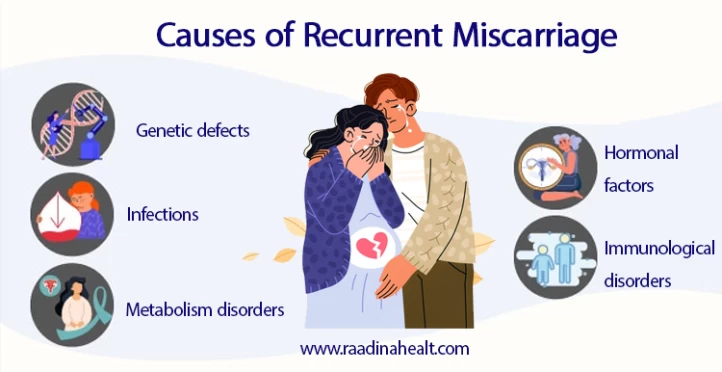
Immunological Disorders: the Most Common Cause of Repeated Miscarriage
Immunological disorder refers to a defect in the immune system of the mother, which, along with environmental causes, leads to abortion. Immunological disorders are the most common causes of recurrent abortion in the first trimester (60%), which usually affect the baby in the first trimester of pregnancy. Although the immune system of the mother plays an important role in all stages of implantation, abortion caused by this problem mostly happens in week 10 (and above) of the pregnancy.
Antiphospholipid syndrome is the most common immunological cause of recurrent miscarriage (in 3-15% of cases). In this syndrome, the body mistakenly makes antibodies that interfere with normal blood clotting. For this reason, mothers with a history of recurrent miscarriages should take blood tests to determine antiphospholipid antibodies every six weeks.
Metabolism Disorders
Uncontrolled diabetes and insulin resistance increase the risk of recurrent miscarriage, especially in obese women and those with polycystic ovary syndrome (PCOS). Controlling gestational diabetes before pregnancy increases the chances of live birth, but no evidence proves that insulin-sensitizing medications reduce the risk of abortion in women with PCOS.
Hormonal factors
Hormonal factors such as thyroid disorders, diabetes, and anovulation (lazy ovary syndrome) account for 17% of recurrent miscarriages before week 10 of pregnancy. Whether the baby stays alive during the first 8-10 weeks of pregnancy depends on the amount of progesterone produced by the ovaries. If the progesterone level in the blood is less than normal, the placental cells do not grow sufficiently, and the fetus doesn't survive.
Diabetes causes abortion by interfering with uterine blood flow, and hypothyroidism causes abortion by making the ovaries produce an inadequate number of eggs in each cycle of ovulation.
Structural problems in the uterus
%10 of recurrent miscarriages happen due to structural problems in the uterus. Deficiency in the uterus's structure usually causes habitual abortion in the second trimester of pregnancy (weeks 13 to 26). The most common structural disorder of the uterus is septate uterus or uterine septum, in which the uterus is divided into two parts by a tissue wall.
In general, uterine problems like cervix disorders, uterine myomas, septate uterus, Asherman's syndrome (adhesions and scars in the uterus), polyps, fibroids, and benign non-cancerous masses in the womb are the main recurrent abortion causes.

Genetic and chromosomal defects
Genetic factors such as embryo's chromosomal problems account for %5 of recurrent miscarriages and can cause abortion at any stage of pregnancy. Also, they are the most common cause of one-time abortion, which often occurs in the early weeks of pregnancy when the length of the fetus is less than 30 mm.
One of the genetic diseases that cause abortion in the second half of pregnancy is thrombophilia, which increases the chance of blood clotting. So far, no effective method has been introduced to diagnose, prevent, and treat recurrent miscarriage in the first half of pregnancy in women with thrombophlebitis, but taking aspirin and heparin can decrease its effects to some extent.
Infection
Bacterial and parasite (protozoa) infectious diseases are the cause of about 5% of recurrent pregnancy losses.
Other causes
Other factors like smoking, thrombosis, some antibodies, etc., account for %3 of habitual abortion cases. According to Erik K. Alexander and Susan (2016), women with autoimmune thyroid disorders have a double rate of spontaneous miscarriage in gestation. To read more about the effects of thyroid disorders, read this article.
It should be noted that in half of the cases, the reason for abortion cannot be identified easily; therefore, blood tests and physical examinations should be done repeatedly to find the cause of abortion.
Repeated Miscarriage Symptoms
The most common signs of abortion are mentioned in the following. Bear in mind that you should seek medical attention immediately after you have these symptoms.
- Reduced symptoms of pregnancy, such as nausea and craving
- Pain in the pelvic and back
- Severe and sharp pain in the lower abdomen
- Nipple pain
- Heavy vaginal bleeding
- Spotting at the onset of abdominal pain
- Fever, diarrhea, and vomiting
- Fatigue and feeling dizzy
- Fluid coming out of the vagina, which shows the rupture of the amniotic sac (water bag)
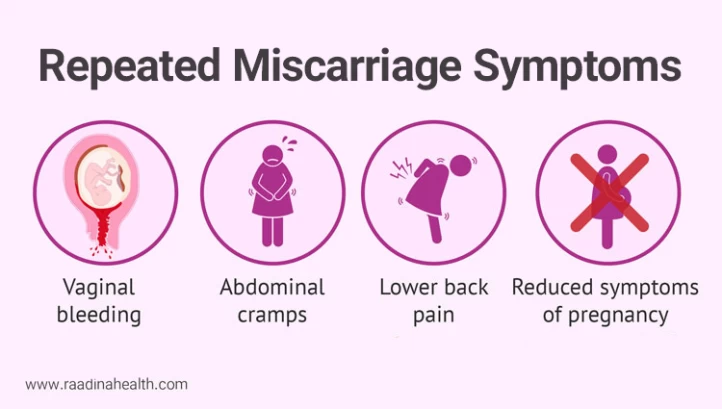
Recurrent Miscarriage Diagnosis
The following tests should be done to diagnose the cause of recurrent miscarriage.
- Examining the history of infertility in both parents
- Testing parents’ chromosomes
- Testing chromosomes of the sex cells and embryo(s)
- Examining uterine cavity, endometrium, and fallopian tubes by image scanning
- Investigating the structure of the uterus with various methods such as hysteroscopy, Hysterosalgiopingography (uterus color image), etc.
- Blood tests to measure the hormone level, especially thyroid hormones and prolactin (responsible for breast milk production)
- Endometrial tissue sampling
- Infection test
- Examining the antibodies that cause recurrent miscarriage, especially antiphospholipid antibodies such as anti-cardiolipin and anti-lupus anticoagulants;
- Examining a mother’s immune system
- Checking for underlying diseases such as diabetes
- Examining problems related to sperm parameters
- Ovarian reserve test to measure the number of remaining eggs and find possible causes of ovarian malfunction (like chromosomal abnormalities)
Recurrent Pregnancy Loss Complications
Recurrent pregnancy loss can have serious physical and mental complications for the couple, especially the mother. The most important and serious risks and side effects of repeated miscarriage are:
- Depression and despair
- Anemia caused by heavy bleeding after abortion
- Intrauterine adhesions (IUA) that causes irregular menstruation and permanent infertility
- Infection of the reproductive system
- Need for dilatation and curettage to remove pregnancy tissues left in the uterus

Asherman's Syndrome and Recurrent Miscarriage
In some rare cases, adhesion (bands of fibrous tissue) and scar tissue are formed inside the womb after miscarriage. This problem may linger until the next pregnancy and cause problems for the mother. This rare condition, which is known as Asherman's syndrome, has symptoms like irregular menstruation and can be diagnosed by hysteroscopy. Therefore, if you have few or no periods after abortion, contact your gynecologist immediately. When Asherman's syndrome is treated surgically, you can get pregnant again.
Recurrent Miscarriage Treatment
The best recurrent abortion treatment depends on its cause and the number of times it has been repeated. If recurrent miscarriage is untreatable, assisted reproductive technologies like IVF and IUI are suggested to the couple. If the reason for habitual abortion is not identified, the doctor often prescribes anticoagulant medications (like aspirin) and heparin injections. Also, the mother should be constantly observed during her next pregnancies.
Suppose genetic or chromosomal abnormalities are found in the fetus via karyotype test. In that case, the doctor warns the couple about the possible congenital defects of the baby and the risk of future pregnancies. If the couple insists on having children, the doctor keeps them under observation from the beginning of pregnancy. For example, they perform chorionic villus sampling (CVS) on the placenta in the first trimester of pregnancy to investigate its genotype.
Another way to find genetic disorders in the fetus is in vitro fertilization (IVF). IVF is not only an assisted reproductive technique but also a way to investigate the egg and sperm fertilized in the laboratory. In IVF, the genetic makeup of the embryo is analyzed, and its possible abnormalities are found before the implantation. By doing so, the doctor can find the best treatment for the embryo's genetic defects.
Heparin Injection
Heparin is used along with vitamin D, aspirin, and intravenous immunoglobulin to treat recurrent miscarriages caused by immunological disorders. Heparin eliminates blood coagulation problems that affect pregnancy, but it shouldn’t be used without a doctor’s permission. Although heparin shots can prevent recurrent miscarriages in some cases, they mostly do not lower the risk of blood clots or abortion during pregnancy.
High blood concentration (polycythemia) also increases the risk of recurrent abortion. Polycythaemia can be detected by taking genetic and total protein tests and monitoring placental changes.
Uterine surgery
Miscarriage in weeks 12 to 24 of pregnancy is a sign of uterine weakness, which can be treated through surgery. In this operation, which is done under spinal anesthesia, the surgeon stitches the cervix (cervical cerclage) to keep it closed until the delivery day. The doctor decides whether cervical cerclage is needed or not by performing an ultrasound and observing the length of the cervix.
Genetic Counseling
If one or both parents suffer from genetic disorders, getting help from a genetic counselor can help prevent or treat repeated miscarriages.

Hormone Therapy
Taking progesterone and HCG hormones in the early months of pregnancy can reduce the risk of miscarriage. In other words, since progesterone thickens the endometrium, taking its supplements and injections facilitates the implantation and prevents repeated abortion.
APS Treatment
If you have high blood concentration or a history of blood clotting, you are prone to convulsions during pregnancy and intrauterine growth restriction (IUGR); therefore, in addition to taking aspirin or injecting heparin, you can increase your blood circulation by using APS medication. The best drugs for antiphospholipid syndrome are heparin and warfarin (Jantoven).
Best Diet for Recurrent Miscarriage
A healthy diet and a BMI between 18.5 and 24.9 helps prevent recurrent miscarriages. In general, obesity or emaciation affects women's fertility and ovulation and increases the risk of abortion. Obesity affects the ovaries, endometrium, and uterus; as a result, the quality of eggs is reduced. Accumulation of fat around the abdomen also impacts the mother's blood sugar level and causes repeated miscarriages.
Since weight fluctuation carries many risks, you should reach a normal weight before trying for a natural pregnancy or using an assisted reproductive method.
Habitual abortion causes a sudden decrease in folic acid and vitamin B9 in women, and sometimes, it prevents the absorption of vitamin B9 due to genetic polymorphism. Therefore, you need to take vitamin B and folic acid to reduce the chance of recurrent miscarriage by 57%.
Foods like raw egg, pineapple, processed meat, and drinks like coffee and alcohol can cause recurrent abortion. Having more than two cups (or 250 mg) of coffee or tea, chocolate, and soda every day increases the risk of miscarriage. Also, drinking any alcoholic beverage before and after pregnancy puts the mother's and fetus's health at risk.
If the cause of frequent miscarriage is celiac disease (gluten intolerance), following a gluten-free diet reduces the chance of recurrent miscarriage. Celiac disease is associated with symptoms such as weight loss, bloating, diarrhea, missed menstrual periods, skin rash, and even depression. Although this health issue severely affects ovulation and fertility, it is sometimes hard to diagnose and treat it properly.

How to Prevent Recurrent Pregnancy Loss?
Consider the following ten tips to prevent recurrent miscarriage:
- Control your weight: Obesity increases the risk of recurrent abortion, so reaching a healthy and stable weight plays an important role in preventing miscarriage.
- Eat healthy: Having fruits and vegetables, as well as foods containing folic acid and vitamin B, not only prevents blighted ovum and recurrent miscarriage but also prevents neurological defects in the fetus. Also, foods rich in vitamin B12 (such as liver, lamb, camel meat, organic eggs, whole milk, whole butter, and animal fat), as well as foods containing vitamins A, B2, and D (including dates, peas, beans, soybeans) regulate menstruation and reduce the risk of repeated miscarriage.
- Drink plenty of water: Drink plenty of water and fresh juice daily, and avoid alcohol, sodas, coffee, and tea before trying to conceive.
- Take the full course of your medications: Take your medications as you’ve been instructed, and refrain from taking drugs without your doctor’s permission.
- Avoid herbal medicines: Pregnant mothers should avoid having oregano, fennel, thyme, and chamomile during their pregnancy to reduce the risk of miscarriage.
- Get enough rest: A good night's sleep, an evening nap, and avoiding hard and heavy activities are very important, especially in the first trimester of pregnancy.
- Be in touch with your doctor: Visit your doctor frequently, inform them when you have an abnormal symptom, and take necessary tests before and during the pregnancy.
- Avoid unhealthy habits: Quitting unhealthy habits like smoking, drinking, skipping breakfast, and not getting enough exercise would help.
- Control your anxiety: Avoiding stress and anxiety during pregnancy reduces the risk of abortion and increases the chance of a healthy delivery. Try controlling your anxiety with breathing exercises, yoga, daily walks, journaling, etc.
- Exercise regularly: Do pregnancy exercises such as walking for 30-40 minutes in the morning or evening, water aerobics, pelvic brace, wall pushups, and modified side plank to prevent recurrent miscarriage and have an easier delivery.

Recurrent Miscarriage Treatment in Iran
In Iran, you are examined by a group of fertility specialists after repeated miscarriages. Once the cause of this disorder is detected, the best treatment is chosen for you. It’s noteworthy that Iranian doctors do not perform surgery unless they have to. So, you will probably be treated by only taking medications and shots.
If you have further questions and concerns about fertility treatments in Iran, the Raadina team is ready to consult you for free.
Conclusion
Women who experience recurrent miscarriages are not infertile and will have a healthy baby eventually. However, it is very important to see a doctor early to find the cause of repeated miscarriage and treat it. In other words, the couple should consult a geneticist, fertility specialist, and urologist right after the second miscarriage.
Recurrent Miscarriage FAQs
1) I’ve had two miscarriages in a row. What should I do now?
After the second miscarriage, visit a doctor immediately. The doctor will treat your hormonal problems, uterine abnormalities, and immunological disorders. You should probably take blood thinning and hormonal medications or undergo one or two surgical treatments.
2) I had three miscarriages; will I ever have a baby?
If you are under 35 and your uterus is still in good condition, you have a %85 chance of conceiving successfully.
3) What are the main causes of repeated miscarriage?
Uterine problems, hormonal imbalance, sperm weakness, immunological problems, and genetic abnormalities are the major causes of repeated miscarriages.
4) Is there hope after four miscarriages?
Yes, you can still have a healthy pregnancy after four miscarriages, but it is more difficult, and you might need medications and surgical treatments before the next pregnancy.





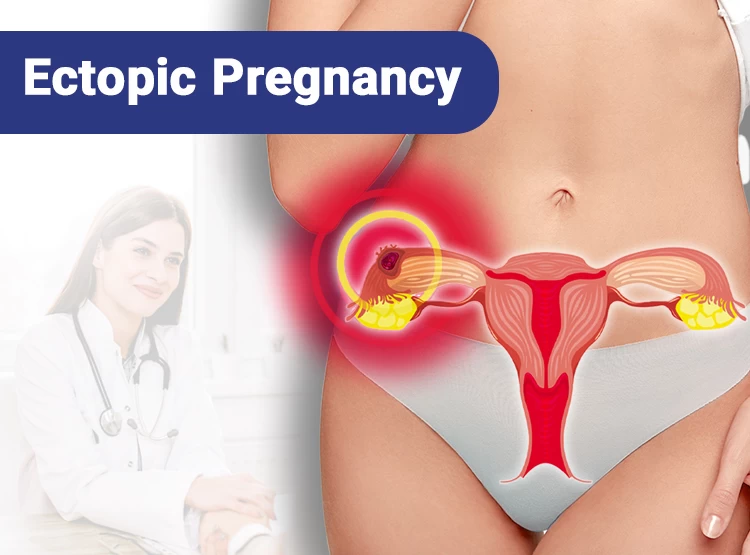

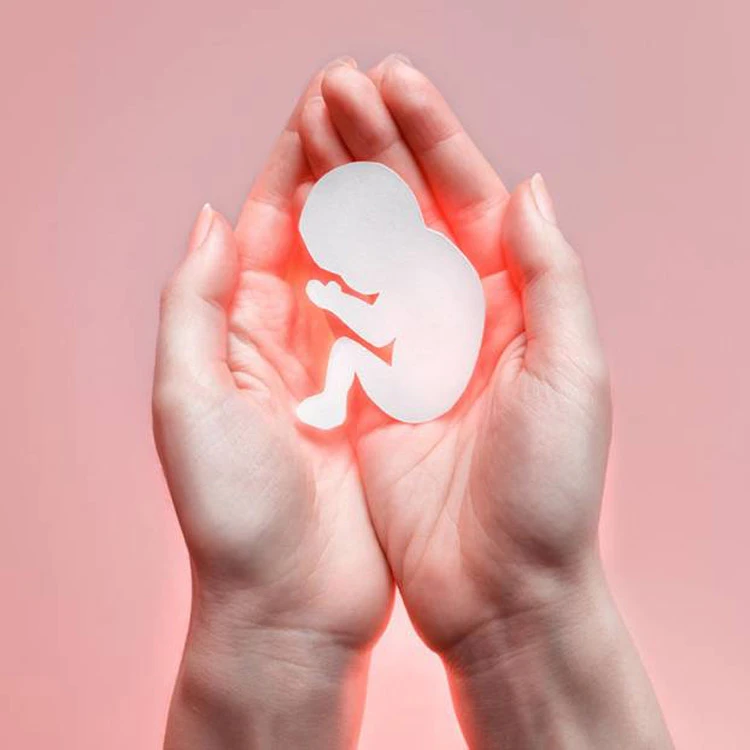
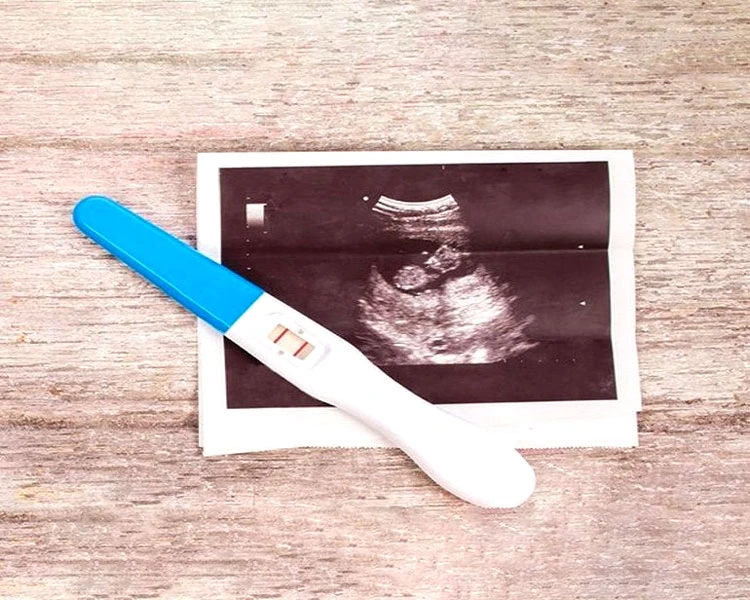


No reviews
Your comment